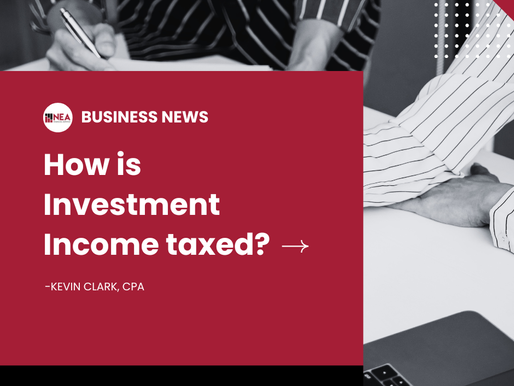top of page
Blog
Posts cover a variety of topics including payroll, bookkeeping, tax information, and even some professional lifestyle pieces. These posts are not intended to replace the counsel of a professional as every situation is unique.


How is Investment Income taxed?
Investment income is a good problem to have. It means your money is working for you, even while you’re sleeping, vacationing, or pretending you understand market commentary on the news. Unfortunately, the IRS is awake for all of it, and different types of investment income are taxed in different ways. Understanding those differences can help you avoid surprises and make smarter decisions throughout the year. First, not all investment income is created equal. Interest income (

Kevin Clark, CPA
Dec 28, 2025


Understanding Tax Brackets: Will a Raise Cost You Money
If there’s one tax myth that just won’t retire despite being well past its usefulness, it’s the idea that “moving into a higher tax bracket means you take home less money.” This is not how tax brackets work (thankfully). But frequently I hear from a client some good news about a raise or bonus, and their first question for me is whether the IRS is going to be waiting with a vacuum hose to suck up all their joy. So let’s clear the air and explain how tax brackets really work.

Kevin Clark, CPA
Nov 28, 2025


What high-earning W-2 employees often miss
If you think all W-2 employees have “simple” taxes, think again—especially if your income is in the upper brackets or you have multiple income streams. High earners sometimes leave money on the table or risk penalties, because they don’t realize certain items apply to them. Here are five common mistakes—or missed opportunities: 1. Overlooking Pre-Tax Benefits Maxing out your 401(k) is just the beginning. Many employers also offer: Health Savings Accounts (HSAs) Flexible Spend

Kevin Clark, CPA
Sep 28, 2025


What are Some Good Tax Moves for Retirement
Taxes are as much as a long-term play as a short-term play, and it’s important to plan your tax strategies as far in advance as possible, especially in regards to your golden years, or what some people refer to as “retirement”. We don’t always just stop working and sit in a rocker or on the beach somewhere with an umbrella drink. But stopping what you’re doing and living differently at some point in the future is what most people aim for. The reality is that most individu

Kevin Clark, CPA
Nov 1, 2023


Can I deduct my kid's allowance?
You may have heard about this nifty tax deduction for the self-employed: getting a Roth retirement account set up for your child and contributing the maximum amount yearly. The sometimes overlooked hiccup with this tactic is that your child has to have EARNED income to contribute to a Roth. And no, an allowance does not constitute earned income. Earned income includes things such as wages, salary, commissions, tips, bonuses, self-employment income, and nontaxable combat pay

Kevin Clark, CPA
Oct 2, 2023


Are there downsides to Roth Rollovers?
Timing can be everything when you’re deciding whether to roll-over your Roth. As a reminder - the reason why Roths are preferred-retirement vehicles for many taxpayers is because any growth that occurs is tax-free. Additionally, any contributions you make can be removed at any time without penalty or tax. What’s the catch? Well, there are income limits that will prevent some high-earners from contributing, as well as annual contribution limits for those who can. If your inco

Kevin Clark, CPA
Aug 15, 2023


Am I blessed or taxed when I’m given a gift?
It’s great to receive, I don’t care what they say. It’s good to give as well, but that’s a topic for another day. The question I get a lot about receiving a gift from a relative or friend, or an inheritance or bequest from a passed family member, is “Do I have to pay taxes on this?” The answer depends on the circumstances – who gave, what did they give, why did they give? But by far the most common situations that I see (life insurance proceeds, gifts by will or bequest,

Kevin Clark, CPA
Jun 15, 2023


Is this REALLY the IRS?
Co-written by Kevin Clark Everyday people get phishing or scam phone calls from someone impersonating an IRS official, but it may get even worse during and right after tax season. It can really help to know how to spot the difference, so you don’t find yourself in a panic or handing over valuable financial information to a scam caller. The forms of payment they request are often unretrievable and the stress from their threats can be overwhelming. We don’t want to see good peo

Heather Foley
Apr 15, 2023


Can I work and still receive all of my Social Security benefit?
Would you like the short answer first? YES! Here’s the “BUT”: Your benefits could be reduced if your total income for the year exceeds a certain amount, and your income may increase to the point that more of your benefits are taxable. It also makes a difference whether you’re receiving benefits before the full retirement age (67). Here are some details and examples of when your earnings may cause your benefits to be reduced: 1. For 2023, you can earn up to $21,240 i

Kevin Clark, CPA
Dec 1, 2022


How do tax return extensions work?
How they work, and one big “Gotcha” to avoid Coming up soon – the extension deadline for income tax returns, which is October 15th for individual returns and September 15th for most business returns. (Sorry if you thought this post was about beauty tips or hair accessories). If you’re one of the millions of American taxpayers who, for various reasons, simply could not complete and file their tax returns back on April 15th, you were wise to take advantage of a simple and free

Kevin Clark, CPA
Aug 15, 2022
bottom of page
